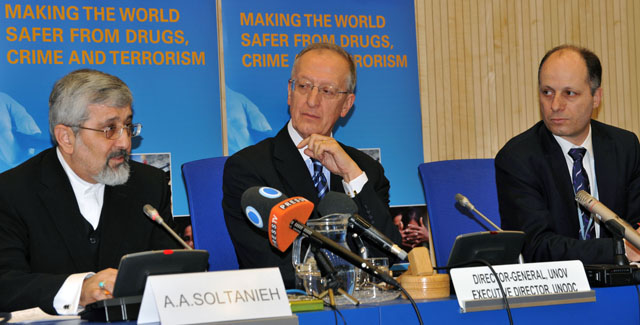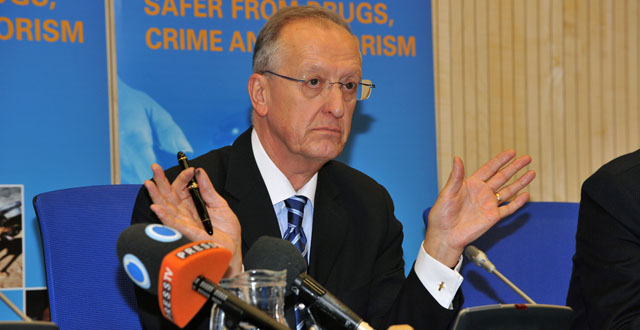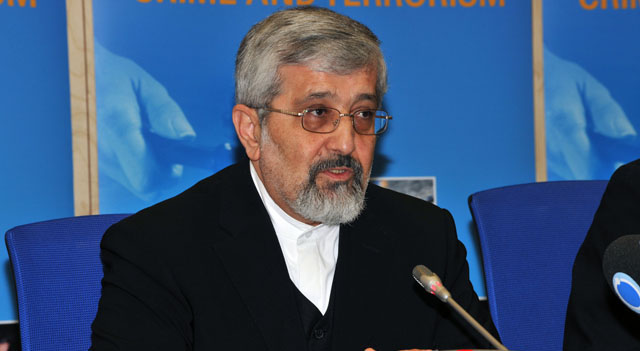Tackling the Threat of Drugs
At the United Nations, M-Building, Room M2 at Vienna International Centre (VIC) there were three big blue posters suspended with a sign of UNODC “Making the world suffer from drugs, crime, and terrorism”. A press conference about “Tackling the threat of drugs” was held on Monday 8 March 2010. The conference was attended by a group of journalists; among them were some Arab journalists. Mr. Antonio Maria Costa, director of the UNODC and the Iranian Ambassador Ali Asghar Soltanieh, Chairman of Commission on Narcotic Drugs, were the speakers during the conference and Mr. Maher Nasser, Director of UNIS in Vienna was the moderator of the session.
[use Open Image in New Window to see pictures enlarged in full]

From right to left Mr. Maher Nasser, UNIS director, Mr. Antonio Maria Costa, UNODC director, Ambassador Ali Asghar Soltanieh.
“Drugs are a threat to health, development and international security” were the issues which Mr. Costa and Ambassador Soltanieh briefed shortly during the press conference. The same issues will be discussed between 8 -12 March at the 53rd session of the Commission on Narcotic Drugs (CND) meeting in Vienna. The 53rd session will also focus on effective ways of raising awareness about the risks of abusing drugs, including cannabis; improving the understanding of drug addiction as a chronic health disorder; and the importance of research and data collection for raising awareness of the world drug problem.
Mr. Costa warned that failure to control drugs will unleash a health disaster in the developing world, and he warned of the growing security threat posed by drugs. He said “the stakes are high: few issues have received as much attention as drug trafficking in the Security Council over the past few months”. He added that “it seems to be forgotten by people in rich countries calling for loosening of drug controls. Why condemn the third world, already ravaged by so many tragedies, to the neo-colonialism of drug dependence?”
Both of Mr. Costa and Ambassador Soltanieh answered the questions of the journalists. It was clear that most of journalists who attended the conference were interested in asking the Ambassador Soltanieh questions not related to the issue of drugs. He cleverly avoided answering these questions, saying that his participation in the press conference was as the chairman of commission on Narcotic Drugs. He demanded that the journalists ask questions related to the drugs issue.
At the end of the press conference, the UNIS team distributed the press release, which is quoted below.
8 March 2010
UNODC Warns of Drug “Health Disaster” in the Developing WorldVIENNA, 8 March (UN Information Service) – In his address to the 53rd session of the Commission on Narcotic Drugs (CND), which takes place this week in Vienna, the Executive Director of the United Nations Office on Drugs and Crime, Antonio Maria Costa, warned that failure to control drugs will unleash a health disaster in the developing world.
“The developing world lacks the treatment facilities and law enforcement to control drugs,” said the head of UNODC. “This seems to have been forgotten by people in rich countries calling for loosening of drug controls. Why condemn the Third World, already ravaged by so many tragedies, to the neo-colonialism of drug dependence?” said the head of UNODC. He identified a number of warning signs: increasing use of heroin in East Africa, cocaine in West Africa, and synthetic drugs in the Middle East and South East Asia.
Referring to health as “the first principle of drug control”, Mr. Costa said that drug addiction is a treatable condition, but warned that inequality within and between states marginalizes poor people who lack access to treatment. “While rich addicts go to posh clinics, poor addicts are being pushed into the gutters or to jail,” he said. UNODC is working with the World Health Organization to achieve universal access to drug treatment, and with UNAIDS to prevent the spread of HIV among injecting addicts.
The UN’s drug control chief said: “We must not only stop the harm caused by drugs: let’s unleash the capacity of drugs to do good.” He reminded the Commission that this seemingly radical idea goes back to the roots of drug control: the preamble of the Single Convention (1961) recognizes that “the medical use of narcotic drugs continues to be indispensible for the relief of pain and suffering”. He appealed to Member States to overcome cultural and socio-economic factors “that deny a Nigerian suffering from AIDS or a Mexican cancer patient the morphine offered to Italian or American counterparts”.
He also appealed for greater respect for human rights. “Around the world, millions of people (including children) caught taking drugs are sent to jail, not to treatment. In some countries, drug treatment amounts to cruel, degrading punishment – the equivalent of torture. People are sentenced to death for drug-related offences, or gunned down by extra-judicial squads,” said Mr. Costa. “As human beings, as well as members of the community of civilized nations, we have a shared responsibility to put an end to this. People who use drugs, or are behind bars, have not lost their humanity or their human rights.”
The head of UNODC warned of the growing security threat posed by drugs. “The stakes are high: few issues have received as much attention as drug trafficking in the Security Council over the past few months,” said Mr. Costa. “Unless Member States deal effectively with the menace posed by organized crime, their security – even their sovereignty – will be under threat, and there will be renewed calls to dump the UN drug conventions that critics claim are the cause of the crime problem,” he said. He stressed the need for greater attention to security, justice and development in vulnerable regions – a process which UNODC is supporting in the Balkans, Central and West Asia, Mesoamerica, and East and West Africa.
In this, his eighth and final Session of the CND, Mr. Costa spoke with pride about how UNODC “has assisted Member States to make drug policy more responsive to the needs of those most seriously affected, along the whole chain of the drug industry: from poor farmers that cultivate it, to desperate addicts who consume it, as well as those caught in the cross-fire.” He said: “In the process, we have helped make the debate less dogmatic, gathered evidence to enrich policy, and provided assistance to reduce vulnerability. We have persistently struggled to quash the sterile debate between those who dream of a world free of drugs, and those who aspire to a world of free drugs.”
However, he warned about complacency, and lack of resources, both for drug control and for UNODC. He described the Office’s current funding level as “untenable”.
For more information on the CND and the complete text of Mr. Costa’s speech, visit the UNODC website at www.unodc.org.
Possibly related posts (automatically generated):
- UNRWA: 60 Anniversary of the Palestinian Misery During a press conference held Wednesday, July 1 2009 at the office of OPEC in Vienna, the Director-General of the...
- OPEC Press Conference Update & Correction 12/2009: I had opportunity to speak with Dr. Suleiman Al-Herbish personally about the contents of this article....
- How Do the PA Ambassadors Represent Palestine? How does the Palestinian National Authority explain the tragic conditions and the administrative corruption of it’s embassy in Austria? Which...
- Women and Date-Rape Drugs See more pictures here Do you think that open borders between the European countries have contributed in one way...













No comments:
Post a Comment